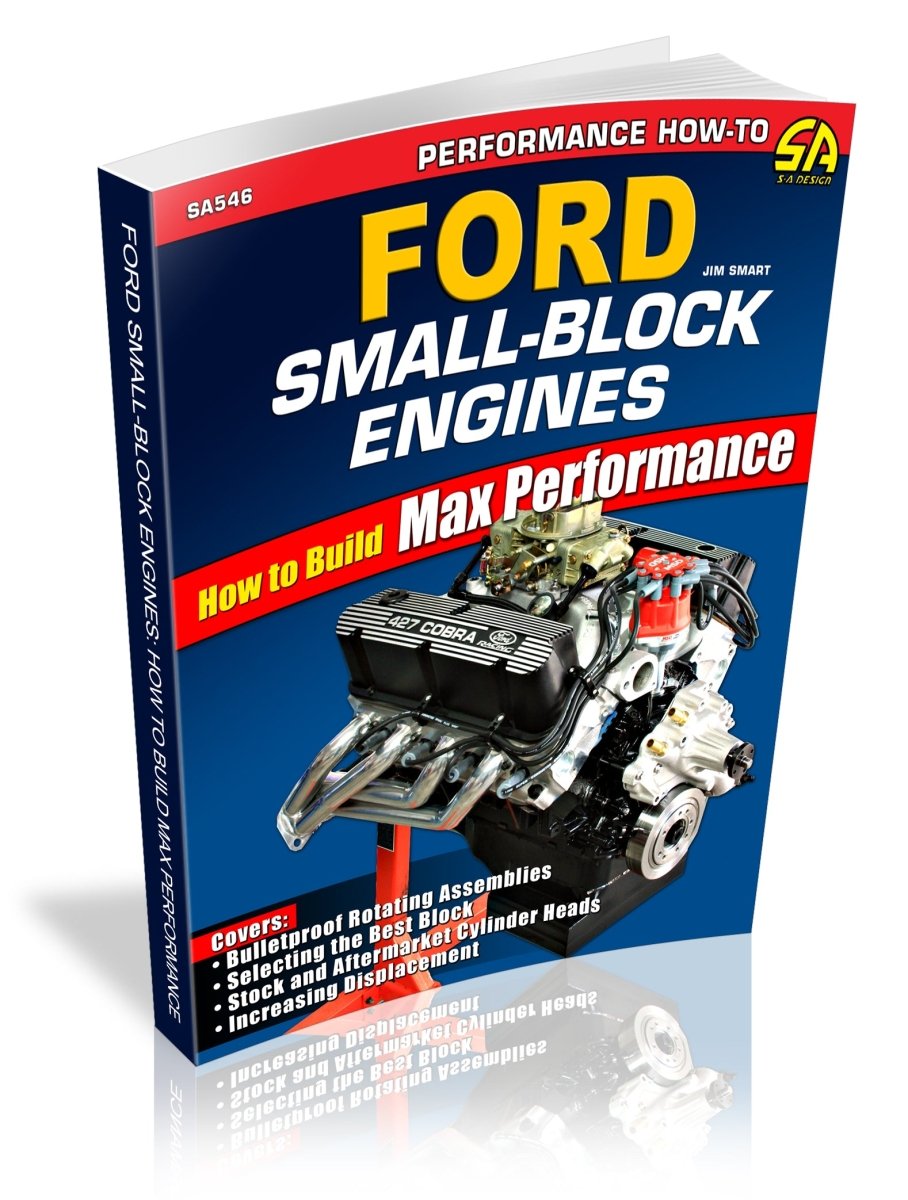Learn how to get the most horsepower out of the popular small-block Ford with this all-new full-color guide.
Much of the attention of the performance aftermarket has turned to the Coyote platform and swaps, but Ford is a little different than GM and Chrysler in that regard. The sheer size of the Coyote engine is problematic because it is very difficult to fit into any vehicle with shock towers. However, the shock-tower cars are often the most popular cars to modify. As such, the small-block Ford remains a viable option for making a large amount of horsepower in a much more affordable package.
In Ford Small-Block Engines: How to Build Max Performance, Ford expert Jim Smart covers all of the major components, including crankshafts, rods and pistons, camshafts, the valvetrain, oiling systems, intakes, carburetors, ignition systems and exhaust systems. Featured are the latest street heads from AFR, Dart, Ford Performance, Edelbrock, and other prominent manufacturers. Aftermarket blocks are also covered extensively from a variety of manufacturers, such as Ford Performance, Dart, Speedmaster, Bill Mitchell Products, and World Products. The basic design of this engine is more than 60 years old, but the aftermarket for this powerplant has grown over the years and is still growing.
While the Coyote engine family has earned a strong following, the original Ford small-block engine retains just as strong of a following, with the massive number of these engines still in use throughout the hobby. Whether you want to get started on your build or you just want to learn about the small-block Ford’s capabilities, this book will make a great addition to your library.
Acknowledgments
Introduction
Chapter 1: Building Basics
Getting Organized
The Physics of Power
Giving Away Power
Building a Stroker
Assembly Technique
The Mock-Up
Checking Endplay
Thermostat
Dynamic Balancing
Common Sense Block and Head Prep
How Much Is Too Much?
Ford Muscle Parts
Chapter 2: The Block
Boss 302
351W
Buying a Used Block
Aftermarket Blocks: Iron or Aluminum?
Ford Performance
Dart Machinery
Speedmaster
BMP
Budget Blocks
Block Preparation
Fasteners and Clean Threads
Chapter 3: Rotating Assembly
Crankshaft
Crankshaft Selection
Stroker Kits
Building a Stroker
Strength in Stud Girdles
Connecting Rods
Aftermarket Connecting Rods
Piston Selection
Harmonic Dampers and Flywheels
Dynamic Balancing
Chapter 4: Lubrication
Chapter 5: Cylinder Heads
255: The Misfit
1968 302 Tunnel Port
Boss 302
Aftermarket Cylinder Heads
Ford Performance Cylinder Heads
Dart Machinery
AFR 64 Edelbrock
Head Work
Chapter 6: Camshaft and Valvetrain
Camshaft Function
Street Camshafts
Dual-Pattern Camshafts
Racing Camshafts
Why Degree a Camshaft?
Timing Components
Lifters
Pushrods and Rocker Arms
Valve-Spring Pressures
Spring Height
Valvetrain Geometry
Rocker-Arm Adjustment
Chapter 7: Induction
Carburetor Selection
Carburetor Size
Carburetor Spacers
Intake Manifold
Bolt-on EFI
EFI Throttle-Body Sizing
Fuel Injectors
Supercharging and Turbocharging
Nitrous Oxide
Chapter 8: Ignition
Spark Knock
Breaker-Point Ignition
Dwell Time
Electronic Ignition
Ignition Coils
Distributor
Ignition Wires
Spark Plugs
Charging System
Starters
Chapter 9: Exhaust
Exhaust-System Sizing
Secondary Tubes and Collectors
Equal-Length, Step, and Tri-Y Headers
Exhaust System Selection
Stainless or Aluminized?
H-Pipes and X-Pipes
Chapter 10: Engine Builds
Budget 347 Stroker
Carroll Shelby’s 427W
Race-Ready Raptor 427W
5.0L High Output
Street 302 Tunnel Port
Supercharged 347 Stroker
5.0L Turbo Power
Source Guide





